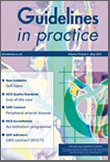Volume 15 Issue 5 - May 2012
| |
Colour Key: |
| |
NICE or Department of Health guideline |
| |
SIGN guideline |
| |
Independent professional body guideline |
| |
Working party guideline |
| |
Other articles |
| |
Editorial |
| |
GPs are well placed to help prevent self-harm
|
|
| |
News |
| |
Guidance issued on direct referral to diagnostic tests for cancer
|
|
|
| |
Evidence Updates on depression and delirium released by NHS Evidence
|
|
| |
New Guideline |
| |
Patients who self-harm should be encouraged to ask for help
|
| |
Dr Clare Taylor, Professor Navneet Kapur, and Professor Tim Kendall discuss the importance of communication in the NICE guideline on long-term management of self-harm |
|
| |
NICE Quality Standards |
| |
High-quality care should be available at all times at end of life
|
| |
Drs Bee Wee and Stephen Barclay explain how the NICE quality standard on end-of-life care requires sensitive communication and effective care planning |
|
| |
GMS Contract |
| |
Peripheral arterial disease increases risk of a cardiovascular event
|
| |
Dr Alan Begg discusses why the inclusion of peripheral arterial disease in the QOF indicators for 2012/13 is so important and how primary care should achieve them |
|
| |
NICE accreditation |
| |
NICE accreditation: raising the standard of guidance production
|
| |
Professor David Haslam explains the role of the NICE Accreditation Programme in developing quality standards and discusses how participation is a positive experience |
|
| |
Out of Hours |
| |
Doctors should receive regular training in prescribing
|
| |
Dr Phil Hammond, broadcaster and sessional GP in Bristol |
|




